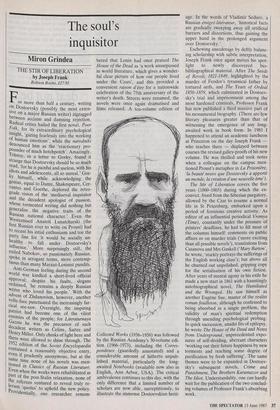The soul's inquisitor
Miron Grindea
THE STIR OF LIBERATION by Joseph Frank Robson Books, £17.95 For more than half a century, writing on Dostoevsky (possibly the most exten- sive on a major Russian writer) zigzagged between acclaim and damning rejection. Radical critics hailed the first novel, Poor F. olk, for its extraordinary psychological insight, 'gazing fearlessly into the working of human emotions', while the narodniki denounced him as the 'reactionary pro- pounder of much hotchpotch'. Amazingly, Tolstoy, in a letter to Gorky, found it strange that Dostoevsky should be so much read, 'for he is painful and useless, with his idiots and adolescents, all so unreal.' Gor- kY himself, while acknowledging the genius, equal to Dante, Shakespeare, Cer- vantes and Goethe, deplored the retro- grade vision of the 'mediaeval inquisitor and the decadent apologist of passion, whose tormented writing did nothing but generalise the negative traits of the Russian national character.' Even the Westernised Anatoli Lunatcharski (the first Russian ever to write on Proust) had to recant his intial enthusiasm and toe the party line for 'it would be socially un- healthy to fall under Dostoevsky's Influence.' More surprisingly still, the exiled Nabokov, so passionately Russian, spoke in arrogant terms, more contemp- tuous than many Marxist-Leninist pundits. Anti-German feeling during the second world war kindled a short-lived official approval: despite his faults, slogans ordained, 'ne remains a deeply Russian writer who loved his people.' With the advent of Zhdanovism, however, another volte-face punctuated the increasingly far- cical see-saw. Overnight, the inspiring patriot had become one of the vilest enemies of the people; for Literaturnaya Gazeta he was the precursor of such decadent writers as Celine, Sartre and Henry Miller. Only chinks of light here and there were allowed to shine through. The 1952 edition of the Soviet Encyclopaedia contained a reasonably objective entry, even if prudently anonymous, but at the same time none of his novels was men- tioned in Classics of Russian Literature. Even when the works were rehabilitated as part of the post-Stalin relaxation, none of the referees ventured to reveal truly re- levant 'quotes' to uphold the new policy. Providentially, one researcher remem- bered that Lenin had once praised The House of the Dead as 'a work unsurpassed in world literature, which gives a wonder- ful clear picture of how our people lived under the Czars', and this provided a convenient raison d'être for a nationwide celebration of the 75th anniversary of the writer's death. Streets were renamed, the novels were once again dramatised and films released. A ten-volume edition of Collected Works (1956-1958) was followed by the Russian Academy's 30-volume edi- tion (1966-1973), including the Corres- pondence (guardedly annotated) and a considerable amount of hitherto unpub- lished material, particularly the long- awaited Notebooks (available now also in English, Ann Arbor, USA). The critical ambivalence continues to this day, with the only difference that a limited number of scholars are now able, surreptitiously, to illustrate the immense Dostoevskian herit- age. In the words of Vladimir Seduro, a Russian emigre-litterateur, 'historical facts are gradually sweeping away all artificial barriers and distortions, thus gaining the upper hand in the prolonged argument over Dostoevsky.'
Eschewing anecdotage by deftly balanc- ing scholarship with subtle interpretation, Joseph Frank once again moves his spot- light to newly discovered bio- bibliographical material. After The Seeds of Revolt, 1821-1849, highlighted by the murder of Feodor's tyrannical father by tortured serfs, and The Years of Ordeal 1850-1859, which culminated in Dostoev- sky's trial and imprisonment among the most hardened criminals, Professor Frank has now published a third massive part of his monumental biography. (There are few literary pleasures greater than that of witnessing the emergence of any long- awaited work in book form. In 1981 I happened to attend an academic luncheon at Princeton on the day Joseph Frank who teaches there — displayed between courses the revised galley-proofs of his new volume. He was thrilled and took notes when a colleague on the campus men- tioned Proust's metaphor in La Prisoniere, `la beaute neuve que Dostoevsky a apporte au monde, la creation d'une nouvelle time).
The Stir of Liberation covers the five years (1860-1865) during which the ex- convict, freed from the Siberian purgatory, allowed by the Czar to resume a normal life in St Petersburg, embarked upon a period of ferocious creative activity. As editor of an influential periodical Vremya (Time), constantly under the pressure of printers' deadlines, he had to fill most of the columns himself: comments on public affairs or on murder trials (`more exciting than all possible novels'), translations from Casanova and Mrs Gaskell (`Mary Barton', he wrote, 'starkly portrays the sufferings of the English working class'); but above all he churned out unpolished, gripping copy for the serialisation of his own fiction. After years of mental agony in his exile he made a new start in 1861 with a hauntingly autobiographical novel, The Humiliated and the Wronged. He saw himself as another Eugene Sue, master of the realist roman feuilleton, although he confessed to being absorbed in a single problem, the validity of man's spiritual redemption through unending psychological probing. In quick succession, amidst fits of epilepsy, he wrote The House of the Dead and Notes from Underground, unprecedented expo- sures of self-dividing, aberrant characters `working out their future happiness by new torments and reaching some degree of purification by fresh suffering'. The same themes were to be expanded in Dostoev- sky's subsequent novels, Crime and Punishment, The Brothers Karamazov and The Idiot. Understandably, one can hardly wait for the publication of the two conclud- ing volumes of Professor Frank's absorbing work.



























































 Previous page
Previous page